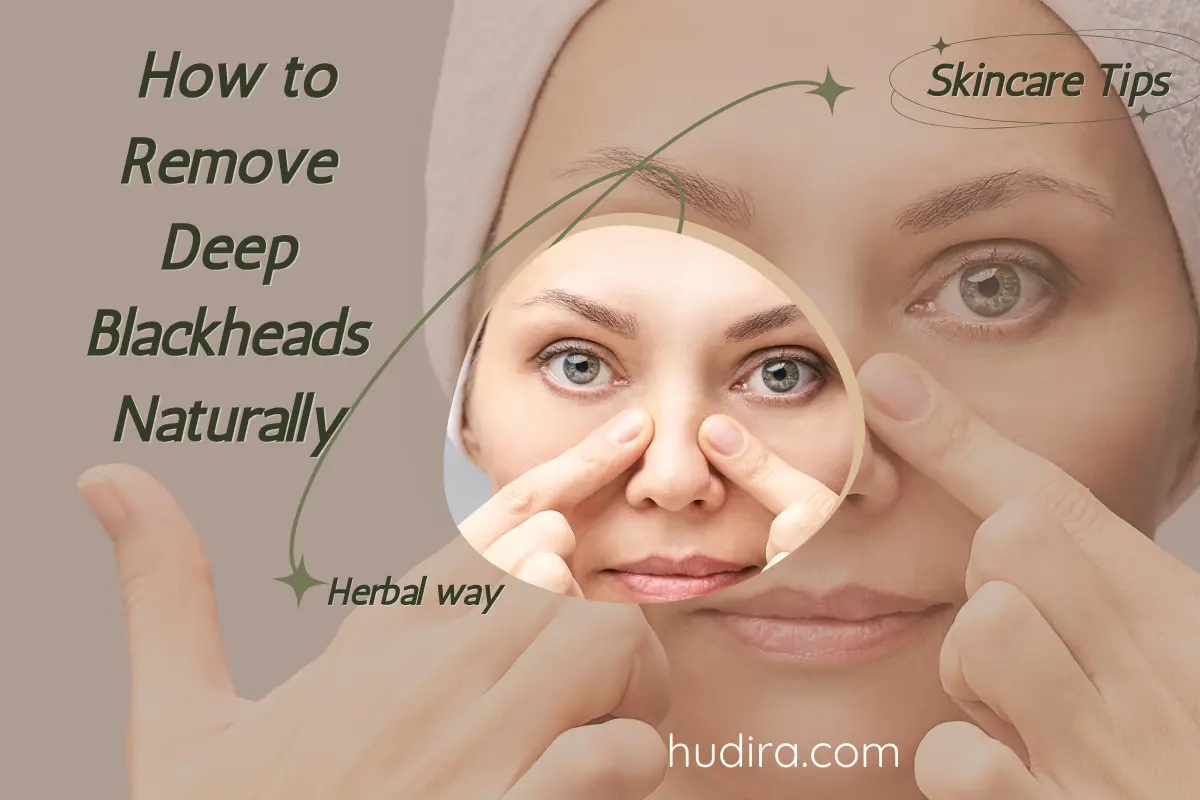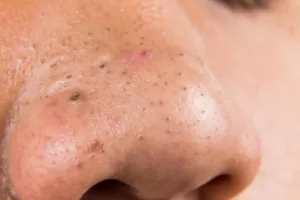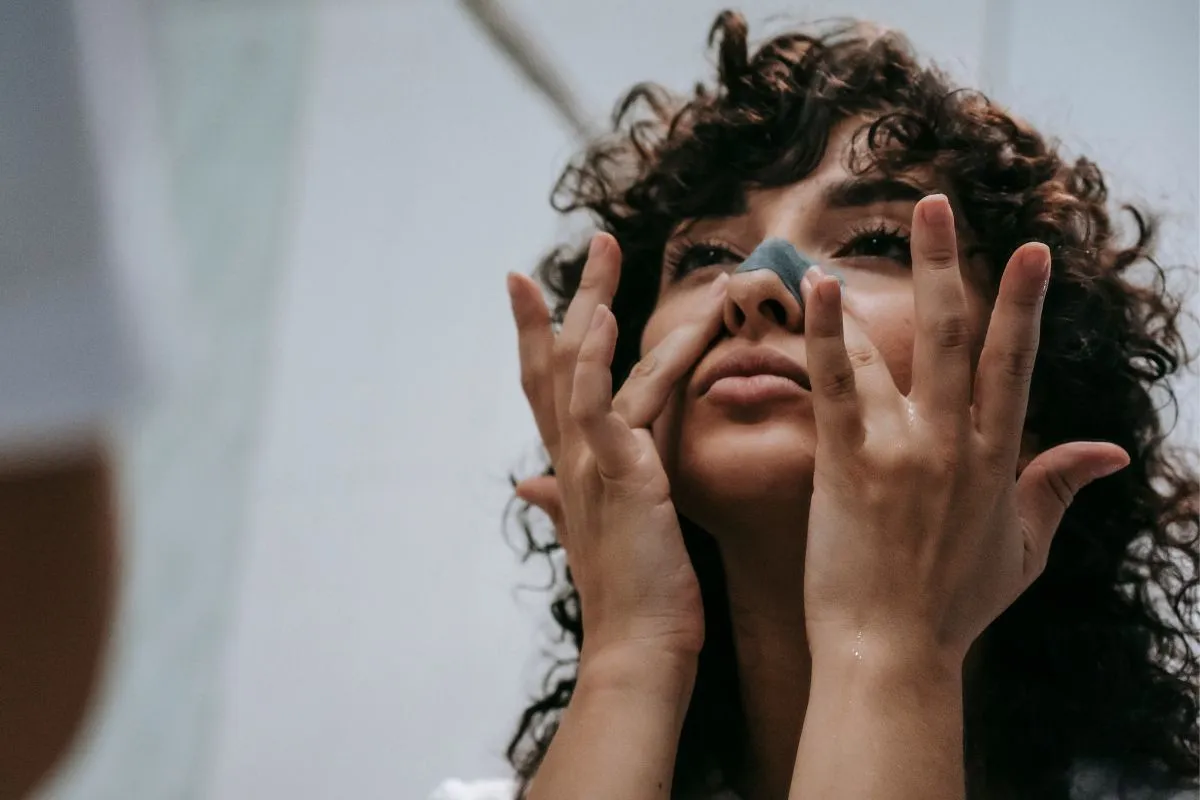No products in the cart.

If you’ve ever stared at the mirror and spotted those stubborn little dots on your nose, chin, or cheeks, you know the struggle of deep blackheads. Unlike regular surface impurities, deep blackheads form when oil, dead skin, and dirt harden inside your pores, creating a plug that seems impossible to remove. The result? Clogged pores that make your complexion appear dull, uneven, and less radiant. While store shelves are filled with chemical-laden blackhead removers and quick-fix strips, these often provide temporary relief and can irritate sensitive skin.
But here’s the exciting part: what if you could rely on nature’s pharmacy to gently target deep blackheads while nurturing your skin’s natural glow? From ancient herbs like neem and turmeric to soothing remedies like aloe vera and multani mitti, there are natural cures for blackheads that don’t just unclog your pores, they restore balance, prevent recurrence, and enhance your confidence. Keep reading, because in this guide we’ll uncover powerful herbal secrets, step-by-step blackheads removal techniques, and even DIY recipes you can try at home. By the end, you’ll know which homemade remedies for blackheads truly work and which myths to avoid.
What Are Deep Blackheads and Why Do They Form?

- Deep blackheads (open comedones) form when oil, dead skin cells, and debris collect inside enlarged pores and harden into a plug.
- Their dark color isn’t dirt, it’s the result of the trapped material oxidizing when exposed to air.
- Because they sit deeper in the pore, they are more stubborn than surface blemishes and often need specific blackhead extraction techniques.
- Triggers include excess oil production, hormonal shifts, poor cleansing habits, heavy makeup, and pollution.
- Harsh scrubbing or strong chemicals can irritate skin, damage the barrier, and make clogged pores worse.
This is why relying on a natural cure for blackheads can be safer, gentler, and more sustainable.
Why Choose Herbal Solutions Over Chemicals?
- Gentle and Safe – Herbal remedies work in harmony with your skin, clearing deep blackheads without stripping away essential oils or causing irritation, making them suitable even for sensitive skin.
- Preventive Action – Botanicals like neem, tulsi, and tea tree naturally limit bacterial growth and excess sebum, helping reduce the chance of future pore blockages.
- Holistic Care – Rich in antioxidants, vitamins, and minerals, herbs not only unclog pores but also support overall skin health by calming inflammation and improving texture.
- Budget-Friendly – Many homemade remedies for blackheads use simple, accessible ingredients such as multani mitti, aloe vera, or honey, making them cost-effective and easy to prepare.
Top Herbal Remedies for Deep Blackheads
1. Neem and Tulsi Cleanser
Neem leaves are rich in antibacterial compounds that fight acne-causing bacteria, while tulsi (holy basil) has purifying and anti-inflammatory properties. Boil a handful of fresh neem and tulsi leaves in water, let it cool, and use the strained liquid as a natural face rinse. Regular use helps reduce excess oil, keeps pores clear, and minimizes the formation of deep blackheads. For added benefit, you can also grind the boiled leaves into a paste and use it as a mild cleanser twice a week.
2. Aloe Vera and Tea Tree Gel
Aloe vera gel hydrates and soothes the skin, reducing redness or irritation that often accompanies clogged pores. Tea tree oil, when properly diluted (0.5–1% concentration), acts as a natural antiseptic and works as a gentle blackhead remover. Mix 2 tablespoons of fresh aloe vera gel with 2–3 drops of diluted tea tree oil, apply as a thin layer on affected areas, and leave it overnight. This combination helps control oil, prevents bacterial buildup, and supports safe blackheads removal without harsh side effects.
3. Multani Mitti (Fuller’s Earth) Mask
Multani mitti, widely known as Fuller’s Earth, is considered one of the best exfoliators for blackheads due to its strong oil-absorbing properties. It unclogs pores by drawing out sebum, dirt, and impurities from deep within the skin. Mix 2 tablespoons of multani mitti with rose water (for soothing) or cucumber juice (for cooling effect) to form a smooth paste. Apply evenly across the face, let it dry for 10–12 minutes, and rinse with lukewarm water. Used weekly, it helps in deep blackhead removal while leaving skin refreshed and matte.
4. Green Tea & Honey Scrub
Green tea is rich in antioxidants like EGCG that help regulate oil production and reduce the oxidation process that turns sebaceous plugs into blackheads. Honey, on the other hand, is a natural humectant and antibacterial agent, healing the skin while keeping it hydrated. To prepare, mix 1 teaspoon of green tea powder (or use the contents of a tea bag) with 1 tablespoon of raw honey. Massage gently on the T-zone or areas prone to blackheads for 2–3 minutes, then rinse off. This scrub helps with deep rooted blackhead removal at home while nourishing the skin.
5. Turmeric & Yogurt Pack
Turmeric contains curcumin, a powerful anti-inflammatory compound that reduces redness and prevents bacterial growth inside clogged pores. Yogurt provides lactic acid, a mild natural exfoliant, which helps in loosening and clearing deep blackheads while improving skin texture. Mix 1 teaspoon of turmeric powder with 2 tablespoons of plain yogurt to form a thick paste. Apply to affected areas for 10–15 minutes, then rinse with lukewarm water. Used once a week, this pack not only aids in blackheads removal but also brightens and softens the skin naturally.
Safe Herbal Blackhead Extraction Techniques
- Steam + Herbal Infusion – Using steam infused with mint leaves or green tea softens clogged pores, making deep blackheads easier to loosen naturally.
- Clay Mask Extraction – Clay masks like multani mitti or kaolin draw out oil and dirt, gently lifting blackhead plugs without the need for harsh extraction tools.
- Herbal Oil Cleansing – Non-comedogenic oils such as jojoba or hempseed dissolve trapped sebum, helping in removing deep blackheads while keeping skin balanced.
Avoid dangerous methods like squeezing or using pins—these can scar the skin.
Homemade Remedies for Blackheads (DIY Recipes)

Clay + Aloe + Green Tea Mask
- 2 tbsp multani mitti
- 1 tbsp aloe gel
- 1 tsp green tea powder
Mix, apply, and rinse after 12 minutes. Great for deep blackhead removal without irritation.
Neem + Yogurt Spot Mask
- 1 tsp neem powder
- 1 tbsp yogurt
Apply on T-zone for targeted blackheads removal.
Oatmeal & Honey Scrub
- 2 tbsp oatmeal
- 1 tbsp honey
Massage gently for natural blackhead extraction.
Lifestyle & Prevention Tips
1. Double Cleanse at Night
Throughout the day, makeup, sunscreen, dirt, and excess oil accumulate on your skin. If not properly removed, they clog pores and worsen deep blackheads. Start with an oil-based cleanser to dissolve impurities, followed by a gentle herbal face wash. This two-step cleansing ensures your pores remain clean and minimizes the risk of buildup.
2. Exfoliate with Herbal Scrubs 2–3 Times a Week
Exfoliation removes dead skin cells that contribute to clogged pores. Herbal scrubs with natural exfoliants like oatmeal, green tea, or fruit enzymes work best as they refine skin texture without irritation. Exfoliating regularly promotes smoother skin, prevents pore blockage, and enhances the results of your blackhead extraction routine.
3. Use a Blackhead Remover Mask Weekly
Masks are excellent for deep pore detox. Herbal clay masks like multani mitti or kaolin draw out impurities and reduce excess sebum. Hudira’s Brightening Face Mask clears dullness, while the Anti-Acne Mask targets stubborn deep blackheads and breakouts by calming inflammation. For a radiant finish, the Orange Glow Mask combines fruit-based exfoliants and herbs to revive tired skin and unclog pores naturally. Rotating these masks weekly gives you both blackhead control and visible glow.
4. Hydrate with Aloe or Rose Water Toner
Hydration is crucial even if you have oily or acne-prone skin. Herbal toners like aloe vera or rose water soothe the skin, balance pH, and lightly tighten pores after cleansing. This prevents over-drying, which can trigger excess oil production and worsen clogged pores.
5. Avoid Harsh DIYs like Baking Soda for Blackheads
While trending online, baking soda is too alkaline and can damage the skin barrier, leading to irritation and sensitivity. Instead of harsh DIYs, stick with proven natural cures for blackheads like Hudira’s herbal masks, aloe gel, or neem-based remedies that cleanse without stripping the skin.
Final Thoughts
Herbs are more than just gentle alternatives; they’re powerful allies in the fight against deep blackheads. By combining time-tested botanicals like neem, aloe, multani mitti, and turmeric with simple DIY techniques, you can achieve lasting clarity without the risks of harsh chemicals. Start integrating these remedies into your skincare routine today, and you’ll see pores that look refined, skin that feels smoother, and confidence that shines through.
Ready to embrace herbal skincare? Explore Hudira’s natural face masks and herbal solutions, designed to give your skin the glow it deserves—safely, effectively, and naturally.
FAQs
Q. How to remove blackheads on nose naturally at home?
Use steam followed by a clay and neem mask. This herbal combo loosens and draws out deep blackheads without damage.
Q. Which herbal remedy is best for removing deep blackheads?
Multani mitti mixed with aloe vera and tea tree is one of the safest natural cures for blackheads.
Q. Are blackhead extraction tools safe?
Only when used professionally. At home, prefer masks and scrubs over tools to avoid scarring.
Q. Can baking soda for blackheads work?
While popular online, dermatologists warn against it. It’s harsh and can damage the skin barrier. Use herbal masks instead.
Q. How often should I use herbal remedies for blackheads removal?
2–3 times per week for masks or scrubs is ideal. Overuse may dry your skin.



Add comment